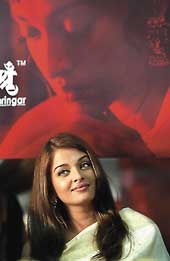 |
| Aishwarya Rai at a promo for Chokher Bali: The sighting |
They couldn’t admire Aishwarya ‘Binodini’ Rai or rave over Raima ‘Ashalata’ Sen. But now, they can finally ‘see’ for themselves what Chokher Bali is all about.
In a release of a different kind, the Rabindranath Tagore novel will be reaching out to those film-maker Rituparno Ghosh could not — the sightless. Chokher Bali became the first ever Bengali novel to be composed and launched in Braille last week to mark the 196th birth anniversary of Louis Braille at the Lal Bihari Shah Braille Academia.
The complete novel comes in three volumes and was distributed among a few blind men and women at a nominal rate of Rs 30 “to encourage the sightless to learn and read Braille”.
The Blind Persons’ Association (BPA) took up the project and organised the programme in the Braille press complex. The association was founded by Nagendranath Sengupta, the first blind student to graduate from Calcutta University nearly 60 years ago. He went on to become a professor at Bangabasi College and later on, was appointed head of the department of philosophy.
“We have, over the years, built three schools for the blind, two spice-grinding units, a public library of Braille books and a talking-book library with the help of individual donations. At present, we have over a thousand members and hope that in the coming days, many more will come forward to join the institution and utilise the facilities,” said Debasish Ghosh, a member of BPA.
“We have had plans to set up a Braille press for nearly two decades now. A paucity of funds has forced us to break up the project into three phases. In the first phase, we constructed a one-storey building on the land we had acquired and installed a machine to print Braille. In the ongoing second phase, we are developing the library. We hope to build a research unit in the third phase,” explained Ghosh.
A state-of-the-art library is the present pursuit. This will include Braille books collected from all over the world and lessons stored in CDs. The aim is to facilitate and speed up the process of learning for the blind.
“Chokher Bali was our first effort to print a full-length book and we plan to come out with many more to help us make the students read Bengali literature on their own,” stressed Ghosh.
The association plans to print more Braille books — A History of Europe, The Life of Ishwarchandra Vidyasagar (penned by Shankho Ghosh), Ramer Sumoti (Saratchandra Chattopadhyay) and Story of My Life (Helen Keller) — in the next 45 days.
“We are also planning to print books and texts that are part of the curriculum at the university level, because the ones that are imported are very expensive,” concluded Ghosh.










